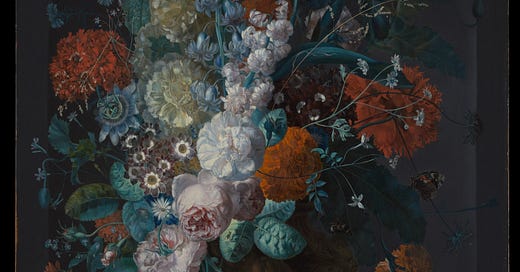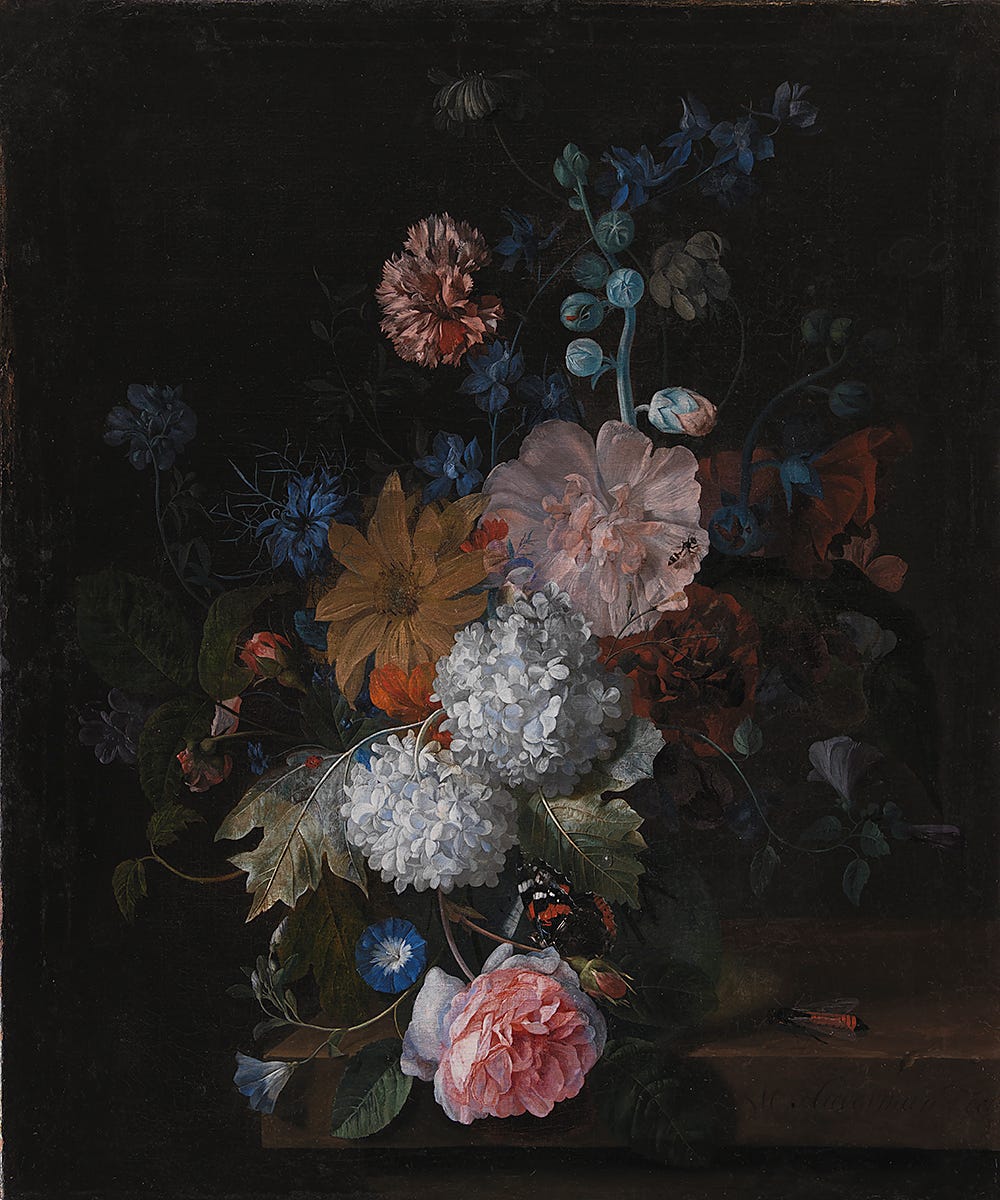Two Summer Classes: On Essay Collections And Description
Some opportunities to study with me ahead, plus a new favorite flower painter.
A Vase of Flowers, by Margareta Haverman, 1716, The Met Open Access Collection
I like to find images for this newsletter in the Met’s Open Access collection and I think this painting by a Dutch flower painter who never produced much work might be my favorite discovery yet. Margareta Haverman, thank you. I was searching for “Summer Reading.” And as I feel my eye wandering the colors, the grapes, the peach, the peonies, the tulip—the leaves—I do feel as if I’m reading summer in a vase. It seems almost underwhelming to use it in a post about summer classes, but when one of them is about description perhaps we will see it as aspirational.
There are apparently only two signed paintings of hers known? May the others be found. Here is the second, “Blomster.”
Much of the last nine years, I have had to learn to be afraid of things I never thought to worry about, and this is a lot like waking up and plotting a speculative fiction novel that you are also inside of, one that has turned out to be episodic and baggy, falling apart on the regular, and yet you must use what you come up with to warn yourself about what to avoid, and what to seek out.
You will never finish this particular novel, if you are like me; it is just how you prepare for living. I have been accused of being a disaster fantasist, someone who is constantly imagining worst case scenarios as a way to protect himself, and by now it is a narrative of many pages, all familiar and unwritten, my phantom novel.
This has led me to thoughts about how to describe this world and life inside of it, and what constitutes realism, magical realism, speculative fiction, speculative nonfiction, the essay and memoir.
“You should write a textbook,” one of my students here said last week.
“I am working on it,” I said.
“You should call it something like—”
“—like Really, How To Write An Autobiographical Novel?”
“Yes.”
*
As a part of that, I have been thinking about setting a lot of late, and how we use it or don’t use it. I had noticed, for example, how much I learned about the IMF crisis in the 1990s in Korea from a Kdrama I watched called Twenty-Five Twenty-One, set during that crisis. Every character’s story is changed by it and we watch as everyone grapples with the consequences. And yet the show is not “about” that. This is not, I should add, a historical drama, nor is it even a particularly serious show. The premise is that a young girl in contemporary South Korea is having a fight with her mother that results in her going to stay with her grandmother for a while, and she finds her mother’s diaries from high school. The story the show tells primarily is drawn from the diaries and describes the mother’s hijinks as an obsessively intense fencing team member, in love with the ex-boyfriend of her hero on the fencing team.
She’s attending the school she’s at because her previous school cancelled fencing due to the IMF crisis. Her love interest had to stop going to college because of the IMF crisis. It’s just a part of the landscape. There’s a comic scene I love where she uses an umbrella as a fencing sword in a fight with a local youth gang. Like I said, not a historical drama.
By contrast, you could watch just about any popular romantic comedy American television show and not know who is president at the time or whether anything happened politically at a national or international level that changed their stories. Do the Friends on Friends ever mention anything about who they’re voting for for mayor, for example? Jokes about the show’s unrealistic approach to life in New York included pointing out the huge apartment but the show did not for example even acknowledge 9/11.
It isn’t just that this kind of omission is of course deranging or insipid, there’s a deep message in it: we are not affected by our politics, is what this says. And of course we are.
A few months ago for example, I stopped by the _________ to drop off a ____ and saw that the person behind the counter was a former student who had taken my class in ——————————. We exchanged pleasantries. I was very happy to see them. When they were my student, they had confessed to me being so anxious about the condition of their family back in ____________ that they did not even take warm showers in winter because their family could not. Their essays for class had been unforgettable, and every now and then I describe them for people when I brag about my students. They were a part of a group of students who were all fans of ______________, and when I did an event with the author, I bought them all copies of the novel and had him sign them for them. The student’s new job suggested a continued literary interest, and I hope they will become a writer someday.
I asked how their family was and learned they were in this country now together. It occurred to me that they would soon be a target for the administration if they were not already and so as I said goodbye I was filled with the fear and loathing I often feel these days for the policies being pursued by what we are calling a government.
When you are a teacher you are among other things a shepherd of other people’s dreams, typically just for a little while but sometimes for much longer. I have many international students among my current and former students here, and they are dear to me. The attacks on their presence in this country is upsetting and the discourse around it is so ignorant I worry for them, for their safety. I worry for them planning a future here. I worry for all of us.
Anyway, I have been thinking a lot about what I can describe, what I can’t, and how my beliefs affect how I try, this is some of the thinking that inspired a new online class I’ll be teaching this summer, on descriptive writing and setting, What It was Like.
My current essay students here inspired the second class, an updated version of another online class, How To Write An Essay Collection. They have been asking me for a reading list as they get ready to finish our personal essay class and I started thinking of some recent favorites, for example, like Simon Wu’s Dancing On My Own, Lucy Ives’ An Image Of My Name Enters America, Jenn Shapland’s Thin Skin, Cathy Park Hong’s Minor Feelings, along with classics like Close To The Knives, Speak, Memory, and The Black Notebooks. I should teach that essay collection class again, I told myself.
In that class I will offer some approaches to the structuring of essay collections ranging from the memoir in essays to the “standard” essay collection, the essay collection that is a single project, conceived of and written accordingly, essay collections organized around a theme, and the critic’s collection.
I will be making the classes accessible to the hearing impaired and there are scholarships, full and partial, available. You can fill out the form to be considered when you sign up. I hope you’ll join me.
It occurs to me that I have not shared readings I’ve been enjoying, shorter ones, and so I thought I would leave a few here.
I wouldn’t have expected to think of Cindy McCain as a hero but here we are.
I was very moved by Azareen Van Der Vliet Oloomi’s “Whose Time Are We Speaking In?” at The Sewanee Review online.
Aube Rey Lescure at Granta with a new essay, “The Secret Pattern.”
I was excited to honor Maxine Hong Kingston at KQED with a number of other favorite writers. I read a short excerpt from China Men.
A favorite early story by Joy Williams, “The Route,” is online at JSTOR.
If you miss the literary magazine Grand Street, like me, their back issues are on JSTOR also, and so here is another Joy Williams story there, “Rot.”
I missed this Patricia Lockwood essay the first time around: “Encounters With Aliens.”
These do not seem like the tactics of government agents.
The planning required to pull of this Ukrainian drone attack on Russian airbases, targeted to their fleet of bombers, is extraordinary to consider.
Namwali Serpeli at NYRB on the extraordinary return of Nettie Jones Fish Tales, back in print from FSG.
Until next time,
Alexander Chee






I thought twenty five twenty one was brave to set it on that period and not let that seize the story, thank you for mentioning it, Your class on setting sounds so tempting!
Hi Alexander, just wondering if the essay collection workshop sessions will be recorded? I would love to attend but unfortunately it’s on at 3am in Australia